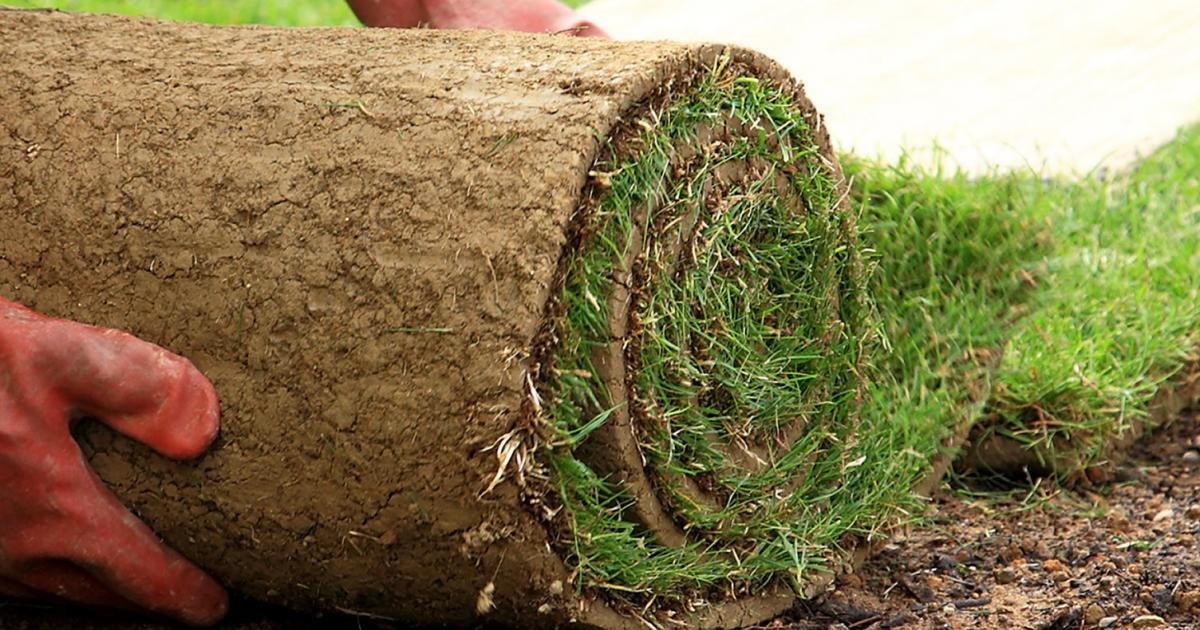Home>Garden Essentials>What Do Turf Grass Managers Do?


Garden Essentials
What Do Turf Grass Managers Do?
Modified: March 7, 2024
Learn what turf grass managers do and how they maintain gardens for optimal growth and appearance. Discover the key responsibilities and skills required for this role.
(Many of the links in this article redirect to a specific reviewed product. Your purchase of these products through affiliate links helps to generate commission for Storables.com, at no extra cost. Learn more)
Introduction
Welcome to the world of turf grass management! If you have ever marveled at the lush green lawns of golf courses, sports fields, or parks, you have witnessed the work of turf grass managers. These dedicated professionals are responsible for the maintenance and care of turf grass, ensuring its health, vitality, and aesthetic appeal. In this article, we will explore the important responsibilities of turf grass managers, the skills and qualifications needed for this role, the educational requirements, and the career outlook in this field.
Turf grass managers play a crucial role in creating and maintaining beautiful and functional outdoor spaces. Their expertise goes beyond simply mowing the grass; they are skilled in all aspects of turf management, from nutrition and irrigation to pest control and maintenance. By implementing effective turf management strategies, they ensure that turf grass remains healthy, vibrant, and visually appealing.
One of the key responsibilities of turf grass managers is the development and implementation of turf management plans. These plans outline the necessary actions to maintain the health and appearance of the turf grass throughout the year. Turf grass managers consider factors such as weather conditions, soil quality, and usage patterns to create customized plans that address the specific needs of the turf grass in their care.
Monitoring and controlling pests and diseases is another vital aspect of turf grass management. Turf grass is susceptible to various pests and diseases that can cause damage and compromise its overall health. Turf grass managers must have a deep understanding of common pests and diseases and the most effective methods for prevention and treatment. By regularly inspecting the turf grass and implementing appropriate pest and disease control measures, they ensure its longevity and resilience.
Irrigation management is also integral to turf grass health. Turf grass managers must carefully monitor and adjust irrigation systems to provide adequate moisture without overwatering. They consider factors such as evaporation rates, precipitation, and soil moisture levels to establish irrigation schedules that promote healthy root development and prevent water wastage. Efficient irrigation management contributes to water conservation and reduces the risk of diseases caused by excessive moisture.
Proper fertilization and weed control are essential for maintaining vibrant and weed-free turf grass. Turf grass managers are knowledgeable about the specific nutrient requirements of different grass species and apply fertilizers accordingly. They also employ effective weed control strategies to prevent the intrusion of unwanted plants that can compete with the turf grass for nutrients and space. By implementing a well-rounded fertilization and weed control program, they ensure the long-term health and beauty of the turf grass.
Assessing and addressing turf grass damage is another important responsibility of turf grass managers. Whether caused by heavy usage, extreme weather, or other factors, turf grass damage must be promptly identified and remedied. Turf grass managers have the skills to evaluate the extent of the damage and implement appropriate repair and restoration methods. This may involve overseeding, sod replacement, soil amendment, or other techniques to restore the turf grass to its optimal condition.
Overseeing mowing and maintenance practices is another key role of turf grass managers. They determine the appropriate height and frequency of mowing based on the type of grass, weather conditions, and desired appearance. They also ensure that mowing equipment is properly maintained and operated to achieve clean and precise cuts, promoting healthier turf grass growth.
Soil testing and analysis play a significant role in turf grass management. Turf grass managers assess soil composition, fertility, and pH levels to determine the specific nutrient and amendment requirements of the turf grass. By conducting regular soil tests, they can make informed decisions regarding fertilization and other soil treatments, ensuring optimal growing conditions for the turf grass.
Lastly, equipment maintenance and operation are essential skills for turf grass managers. They are proficient in the use of various tools and machinery, such as mowers, aerators, sprayers, and irrigation systems. They perform routine maintenance and repairs to keep the equipment in excellent working condition, ensuring efficient and effective turf grass management.
With their deep knowledge and expertise in turf grass management, these professionals contribute to the creation of beautiful outdoor spaces that can be enjoyed by the public. In the next sections of this article, we will delve into the skills and qualifications required for turf grass managers, the educational requirements, and the promising career outlook in this field.
Key Takeaways:
- Turf grass managers are like the doctors of grass, taking care of its health, appearance, and overall well-being. They use their knowledge and skills to create beautiful outdoor spaces for everyone to enjoy.
- To become a turf grass manager, you need to know about different types of grass, soil science, and how to operate and maintain equipment. Getting a degree in turfgrass management can give you a competitive edge in this field.
Responsibilities
Turf grass managers have a wide range of responsibilities in ensuring the health and vitality of turf grass. Let’s take a closer look at some of the key tasks they handle:
Maintaining and Caring for Turf Grass
First and foremost, turf grass managers are responsible for the overall care and maintenance of turf grass areas. This includes regular mowing to maintain the desired grass height and appearance, as well as edging to create sharp and well-defined borders. They also ensure proper aeration of the soil to promote healthy root growth and optimal nutrient absorption.
Developing and Implementing Turf Management Plans
Turf grass managers play a crucial role in developing and implementing comprehensive turf management plans. These plans outline the necessary actions and schedules to perform various maintenance tasks throughout the year. By taking into account factors such as turf species, climate, and usage patterns, these plans help ensure that the turf grass remains healthy and vibrant.
Monitoring and Controlling Pests and Diseases
Pests and diseases can pose significant threats to the well-being of turf grass. Turf grass managers are responsible for regularly monitoring for signs of pest infestation or disease outbreaks. They implement effective pest control measures, such as applying appropriate pesticides or biological controls, to prevent damage and reduce the risk of spreading. Additionally, they identify and employ suitable disease management strategies to maintain the health and appearance of the turf grass.
Read more: What Does Potassium Do For Turf Grass
Irrigation System Management
Proper irrigation is crucial for the health and vitality of turf grass. Turf grass managers are responsible for managing and maintaining irrigation systems to ensure that the turf grass receives adequate moisture. They monitor weather conditions, evaporation rates, and soil moisture levels to establish appropriate irrigation schedules. By providing the right amount of water at the right time, they promote healthy growth and minimize water waste.
Fertilization and Weed Control
Fertilization and weed control are essential tasks in maintaining healthy and visually appealing turf grass. Turf grass managers have a deep understanding of the nutrient requirements of various turf grass species. They apply fertilizers on a regular basis, carefully considering the specific needs of the turf grass and adjusting the application rates accordingly. Additionally, they implement effective weed control strategies to prevent the growth and spread of unwanted plants, ensuring that the turf grass remains lush and weed-free.
Assessing and Addressing Turfgrass Damage
Turf grass can sustain damage due to various factors, such as heavy usage, extreme weather conditions, or accidents. Turf grass managers are responsible for assessing the extent of the damage and implementing appropriate measures to address it. This may involve overseeding to promote new growth, repairing or replacing damaged sections of grass, or implementing soil amendment techniques to restore the health and appearance of the turf grass.
Overseeing Mowing and Maintenance Practices
Turf grass managers are responsible for overseeing mowing and maintenance practices to ensure that the turf grass is well-maintained. They determine the appropriate mowing height and frequency based on the turf grass species, season, and desired appearance. They also ensure that mowing equipment is in good working condition and properly operated to achieve clean and precise cuts.
Read more: What Shoes Do You Use For Turf Grass
Soil Testing and Analysis
Understanding the composition and quality of the soil is crucial in turf grass management. Turf grass managers conduct soil tests to assess the pH level, nutrient content, and overall health of the soil. Based on the test results, they make informed decisions regarding soil amendments and fertility management to provide the optimal growing conditions for the turf grass.
Equipment Maintenance and Operation
Turf grass managers are responsible for the proper maintenance and operation of turf management equipment. This includes routine maintenance tasks such as cleaning, sharpening blades, and checking fluid levels. They also ensure that equipment is operated safely and efficiently to achieve the desired results in turf grass maintenance and care.
These are just some of the key responsibilities of turf grass managers. They require extensive knowledge, attention to detail, and a passion for creating and maintaining beautiful outdoor spaces. With their expertise and dedication, turf grass managers play a vital role in ensuring the health and aesthetic appeal of turf grass areas.
Skills and Qualifications
Becoming a competent and successful turf grass manager requires a combination of knowledge, skills, and personal qualities. Let’s explore the key skills and qualifications needed for this role:
Knowledge of Turf Grass Species and Characteristics
A strong foundation in turf grass species and their unique characteristics is essential for turf grass managers. They should have knowledge of different grass types, such as warm-season or cool-season grasses, and understand their specific growth habits, tolerance to various conditions, and maintenance requirements. This knowledge helps them make informed decisions regarding turf grass selection, planting, and care.
Read more: What Do You Put Under Astro Turf
Understanding of Soil Science and Plant Nutrition
Turf grass managers should have a solid understanding of soil science and plant nutrition. They need to comprehend the complex relationships between soil composition, pH levels, and nutrient content, and how they affect turf grass health. This knowledge enables them to analyze soil test results, identify nutrient deficiencies or excesses, and develop tailored fertilization programs to promote healthy and vigorous turf grass growth.
Ability to Operate and Maintain Turf Management Equipment
Turf grass managers often work with a variety of equipment and machinery to carry out their responsibilities. This includes mowers, aerators, sprayers, irrigation systems, and more. They should have the ability to operate these tools effectively and safely, following proper protocols and guidelines. Additionally, turf grass managers should possess the knowledge and skills to perform routine maintenance and repairs on the equipment to ensure its optimal performance.
Excellent Problem-Solving and Decision-Making Skills
Turf grass managers encounter various challenges and issues in their day-to-day work. They need strong problem-solving and decision-making skills to assess situations, identify the root causes of problems, and develop effective solutions. Whether it’s addressing turf grass diseases, dealing with equipment failures, or managing unexpected weather conditions, turf grass managers need to make quick and sound decisions to preserve the health and appearance of the turf grass.
Strong Communication and Leadership Skills
Effective communication and leadership skills are vital for turf grass managers. They often work in teams and need to effectively communicate instructions, expectations, and goals to their staff. They must have the ability to motivate and inspire their team members, ensuring that every task is performed efficiently and to the highest standards. They also need excellent communication skills to collaborate with other professionals, such as landscape architects, irrigation specialists, and pest control experts, to achieve coordinated and successful turf management.
Read more: What Is Turf Grass
Physical Stamina and Ability to Perform Manual Labor
Turf grass management is physically demanding work that often involves manual labor. Turf grass managers should have the physical stamina to handle tasks such as mowing, aerating, and lifting heavy equipment or materials. They should be able to work outdoors in various weather conditions, sometimes for extended periods, to ensure the proper care and maintenance of the turf grass.
Knowledge of Safety Protocols and Regulations
Working in turf grass management requires adherence to safety protocols and regulations. Turf grass managers should have a thorough understanding of safety guidelines and best practices to ensure a safe working environment for themselves and their team members. They should be well-versed in the proper handling and storage of chemicals, machinery safety procedures, and any relevant local or national regulations pertaining to turf grass management.
These skills and qualifications form a strong foundation for a successful career as a turf grass manager. By continuously honing these competencies and staying up to date with industry developments, turf grass managers can excel in their roles and contribute to the maintenance and enhancement of stunning outdoor spaces.
Educational Requirements
While there is no strict set of educational requirements to become a turf grass manager, certain levels of education can greatly benefit individuals pursuing this career path. Here are the typical educational pathways for aspiring turf grass managers:
High School Diploma or Equivalent
A high school diploma or equivalent is the minimum requirement for entering the field of turf grass management. Throughout high school, individuals can take advantage of courses in biology, horticulture, agriculture, and chemistry to gain a foundational understanding of plant biology, soil science, and basic turf grass principles. Engaging in extracurricular activities related to landscaping, sports field maintenance, or gardening can also provide valuable hands-on experience.
Read more: What Do You Put Under Turf Grass
Associate’s or Bachelor’s Degree in Turfgrass Management or Related Field (Preferred)
While a high school diploma may suffice for some entry-level positions, obtaining an associate’s or bachelor’s degree in turfgrass management or a related field is highly preferred and provides a significant advantage. These degree programs offer in-depth coursework and hands-on training, equipping individuals with the knowledge and skills necessary for successful turf grass management.
A turfgrass management program typically covers a range of subjects including turfgrass species identification, soil science, plant nutrition, pest management, irrigation techniques, equipment operation, and maintenance practices. Students also learn about business management, budgeting, and leadership skills, which are essential for those interested in career advancement or entering managerial positions within the turf grass industry.
Furthermore, these degree programs often include internships or cooperative education experiences, allowing students to gain practical, real-world experience in turf grass management. This hands-on training provides valuable exposure to industry best practices, strengthens problem-solving skills, and helps build professional networks.
While it is possible to pursue a career in turfgrass management without a degree, candidates with formal education in the field are generally more competitive and have a broader understanding of the complexities involved in managing turf grass areas. Additionally, a degree can often lead to better opportunities for career advancement and higher earning potential.
It is important to research and choose a reputable institution that offers turfgrass management programs accredited by recognized industry associations. These accrediting bodies ensure that the curriculum meets specific standards and provides a comprehensive education in turf grass management.
Continuing education and staying up to date with industry trends and advancements is also crucial for turf grass managers. Participating in workshops, seminars, and certification programs offered by professional organizations can enhance knowledge and skills, allowing turf grass managers to stay at the forefront of the industry.
Ultimately, while a high school diploma may be the minimum requirement, obtaining a degree in turfgrass management or a related field significantly increases the chances of success in a career as a turf grass manager.
Career Outlook
The career outlook for turf grass managers is promising, with a variety of job opportunities and potential for advancement. Let’s explore some of the key aspects of the career outlook in this field:
Job Opportunities in Various Outdoor Venues
Turf grass managers can find employment in a range of outdoor venues, including golf courses, sports fields, parks, residential communities, and corporate landscapes. These venues rely on well-maintained turf grass to provide attractive and functional outdoor spaces. As a result, there is a consistent demand for skilled turf grass managers to ensure the health and appearance of the turf grass in these settings.
Potential for Career Advancement and Specialization
Turf grass management offers opportunities for career advancement and specialization. With experience and additional training, turf grass managers can progress to supervisory or managerial positions, overseeing a team of turf grass maintenance professionals. They can also choose to specialize in specific areas, such as golf course management, sports field maintenance, or landscape design. Specialization allows turf grass managers to hone their skills and become experts in their chosen fields, opening up new professional opportunities.
Read more: What Is An Astro Turf
Increasing Demand for Sustainable Turf Management Practices
As environmental sustainability becomes a key focus in various industries, including landscaping and turf management, there is a growing demand for professionals who can implement sustainable practices. Turf grass managers who are knowledgeable about sustainable turf management methods are highly sought after. This includes techniques such as water-conserving irrigation systems, organic fertilization, integrated pest management, and the use of native grass species. As the demand for eco-friendly practices continues to rise, turf grass managers with a strong understanding of sustainability principles will have a competitive edge in the job market.
Overall, the career outlook for turf grass managers is promising, thanks to the consistent need for well-maintained and aesthetically pleasing turf grass in various outdoor settings. By staying current with industry trends, continually building their skills and knowledge base, and embracing sustainable practices, turf grass managers can seize the opportunities for career advancement and contribute to the creation and preservation of beautiful outdoor spaces.
Conclusion
Turf grass managers play a crucial role in maintaining the health, beauty, and functionality of turf grass in outdoor venues such as golf courses, sports fields, parks, and residential landscapes. Their responsibilities encompass a wide range of tasks, including maintaining turf grass, developing management plans, monitoring pests and diseases, managing irrigation systems, implementing fertilization and weed control, addressing turfgrass damage, overseeing mowing and maintenance practices, conducting soil testing, and managing equipment.
To excel in this field, turf grass managers need a combination of knowledge, skills, and qualifications. This includes a deep understanding of turf grass species and characteristics, expertise in soil science and plant nutrition, the ability to operate and maintain turf management equipment, excellent problem-solving and decision-making skills, strong communication and leadership abilities, physical stamina, and knowledge of safety protocols and regulations.
While a high school diploma is the minimum requirement, obtaining an associate’s or bachelor’s degree in turfgrass management or a related field is highly preferred and provides a competitive edge in the industry. A formal education provides individuals with a deeper understanding of turf grass principles, hands-on training, and the opportunity to build professional networks through internships and cooperative education experiences.
The career outlook for turf grass managers is positive with job opportunities available in various outdoor venues. There is also potential for career advancement and specialization, allowing individuals to progress to supervisory or managerial roles and specialize in areas such as golf course management or sports field maintenance. Additionally, there is an increasing demand for sustainable turf management practices, making knowledge of eco-friendly methods a valuable asset for turf grass managers.
In conclusion, turf grass managers play a crucial role in creating and maintaining beautiful outdoor spaces. They possess the knowledge, skills, and qualifications to ensure that turf grass remains healthy, vibrant, and visually appealing. By integrating sustainable practices and staying current with industry advancements, turf grass managers contribute to the creation of eco-friendly and captivating landscapes.
Frequently Asked Questions about What Do Turf Grass Managers Do?
Was this page helpful?
At Storables.com, we guarantee accurate and reliable information. Our content, validated by Expert Board Contributors, is crafted following stringent Editorial Policies. We're committed to providing you with well-researched, expert-backed insights for all your informational needs.










0 thoughts on “What Do Turf Grass Managers Do?”